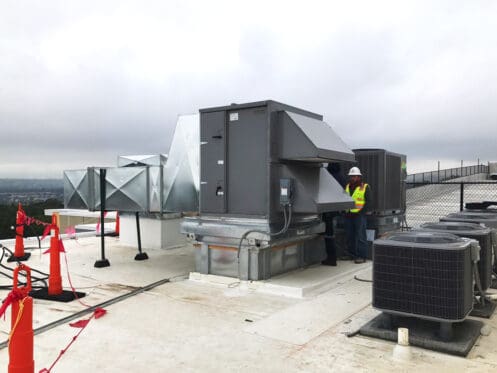One of the major challenges of commercial building management is establishing a heating and cooling plan that works well for all occupants. Installing a high-quality commercial air conditioner in your Metuchen, NJ, property will give you flexibility for accommodating all employees, tenants, and onsite operations. However, caring for this investment will require ongoing diligence. The following are five tips to help you optimize and maintain your new equipment.
1. Schedule Professional Duct Sealing Service
Leaky HVAC air ducts are a problem in any building. In commercial facilities, leaky ductwork can reduce AC efficiency by as much as 20%. Not only will this increase your energy usage, but it can also have a noticeable impact on indoor comfort. With leaky ducts, much of the conditioned air that your system produces will be lost behind drywall or distributed in remote areas where ducting is exposed. After paying top dollar for a high-quality air conditioner, you don’t want to cut corners on duct sealing.
One of the lesser-known effects of leaky ductwork is increased system stress. With leaky ducts, your air conditioner will work a lot harder to create and maintain the indoor temperature you want. Leaky air ducts don’t just deposit conditioned air in the wrong spaces. They also draw unfiltered air in. This can leave condenser coils and other interior components covered in particulate matter.
There are a few basic options for an HVAC air duct sealant. The cheapest and most flexible is duct tape rated for HVAC work. This product can be used to seal off visible seams, but there are more long-term options that provide the performance support that your cooling system deserves. The tape that is used for this project should be fire- and smoke-rated for use in commercial applications.
Other options for commercial duct sealing are mastic duct sealant and Aeroseal duct sealant. Mastic duct sealant is a water-based paste that’s applied around all seams. It dries to create a hard, airtight seal. This is an affordable, reliable, and long-lasting option for protecting your ductwork and reducing inefficiency issues.
Although slightly more costly, Aeroseal duct sealing is hailed by the U.S. Department of Energy (DOE) as one of the greatest technological and scientific accomplishments of its time. For a high-quality commercial air conditioner, Aeroseal duct sealant is the perfect option for ensuring optimum air duct performance and minimum HVAC system stress.
2. Choose the Right Programmable Thermostat for Your Building
Depending on the size and layout of your facility and the type of cooling equipment you’re using, installing programmable thermostats can save you a substantial amount of money each year. If you haven’t done so already, now is the time to upgrade from a standard thermostat model to a smarter design.
There are several ways in which a programmable thermostat can prevent wasted energy and save you money. You can use these devices to raise or lower indoor temperatures on weekends and during the evening hours so that your air conditioner or heater isn’t working when the building is empty. This eliminates the potential for human error by making it unnecessary for maintenance teams or employees to make after-hours adjustments. Choosing a Wi-Fi-enabled smart thermostat will give you the ability to make temperature adjustments remotely. If there are schedule changes, you can cool the workspace down before anybody arrives or turn off your air conditioner when everyone leaves for an early weekend.
Smart thermostats are learning devices that constantly collect information about user preferences and habits. In commercial environments, they quickly adapt to multiple users’ needs. Best of all, these devices actively collect data that business owners can use to strategically lower or better manage their heating and cooling costs. Programmable and smart thermostats are available as seven-day models for businesses that run nonstop. There are also 5+2-day options that work well for companies that operate on weekdays but close their doors on weekends.
3. Invest in a Preventative Maintenance Plan
Preventative AC maintenance is an essential, recurring task that can get lost in the long, itemized lists of things that management teams are focusing on. This is one of many reasons to search for and purchase a preventative AC maintenance plan.
With a preventative maintenance plan, you’ll find it easier to remain compliant with the terms and conditions of the manufacturer warranty that came with your new cooling equipment. Commercial preventative maintenance programs are often structured with the requirements of manufacturer warranties in mind. Joining one will give you the benefit of early reminders when the time to schedule AC maintenance rolls around. You may even get:
- Priority scheduling
- Discounted rates on standard or emergency repairs
- Discounts on replacement parts
- Loyalty bonuses for savings on future equipment purchases
Having a preventative maintenance plan can also make it easier to get timely AC repairs during peak seasonal demand. You’ll also be provided with adequate documentation of prior maintenance. This will be beneficial if proof of maintenance is required for processing any warranty or insurance claims.
4. Avoid All DIY AC Repairs
No matter how large or small your commercial building may be, there may come a time when you consider cutting costs with DIY AC maintenance or repairs. This is common among commercial property owners that have their own in-house maintenance teams.
Handymen and hired maintenance team members are not licensed HVAC technicians. Letting your own staff tamper with the moving parts of your cooling system could void your manufacturer’s warranty. In the long run, it’s always a good idea to hire an experienced HVAC professional.
When having a high-end air conditioner installed, it’s important to have your HVAC technicians walk you through even the most basic maintenance tasks. In small facilities with modest-sized air conditioners, this could be as easy as pulling an old filter out and putting a brand new one in. In larger buildings with roof-mounted units, variable refrigerant flow (VRF) air conditioners, or water-cooled ACs, the process could be more complex. Have your in-house maintenance team present when these basic tasks are explained by your HVAC installer.
Most commercial air conditioners require twice-annual maintenance and quarterly filter changes. For units that are especially costly or complex, scheduling preventative service every three months can prove worthwhile.
5. Make Every Effort to Improve Your Indoor Air Quality
Indoor air quality is as much a concern in commercial facilities as it is in residential buildings. Considering the benefits of air scrubbers, air purifiers, or media filters is definitely worthwhile when it comes to protecting the health of your employees, guests, and stakeholders. However, these integrated HVAC system accessories can also extend the lifespan of your new cooling equipment by limiting the number of pathogens, allergens, and other contaminants that can make their way into the interior of your equipment.
We proudly serve Metuchen, New Jersey, and the surrounding areas. We offer residential and commercial heating, cooling, and plumbing services. We also provide oil-to-gas conversions, indoor air quality solutions, and preventative maintenance plans. If you need help optimizing and maintaining your commercial air conditioner, give First Choice Plumbing, Heating & Air Conditioning a call today.



